Online repository of resources

To support clinicians’ continuous professional development, we have created this online repository of resources related to stroke research and care (including those resulting from the interactive learning series and annual conference) has been created.
This repository is part of the East of England Stroke Forum.
Toolkits and guidance
Toolkits and guidance
RightCare Stroke Toolkit
This RightCare toolkit will help support local health systems to understand the priorities in stroke prevention, identification, acute care, and rehabilitation, as identified in the Integrated Stroke Delivery Networks (ISDNs) National Stroke Service Model (NSSM). Download it now.
Latest research
Latest research
PHOTONIC: Prehospital triage for suspected stroke patients
PHOTONIC (PreHOspital Triage for potential stroke patients: lessONs from systems Implemented in response to COVID19) builds on our recent rapid service evaluation of prehospital triage in North Central London and East Kent, which focused on safety, effectiveness, and usability. Learn more…
Pre-hospital triage for potential stroke patients: a Q&A with Angus Ramsay
Dr Angus Ramsay is part of the Rapid Service Evaluation Team (RSET) – a collaboration between UCL and the Nuffield Trust. His latest RSET research looks at a new NHS service for triaging potential stroke patients before they reach hospital. Read the interview.
Prehospital video triage of potential stroke patients in North Central London and East Kent: rapid mixed-methods service evaluation
This study showed that prehospital video triage was usable, acceptable and safe in stroke care, but it did require clinician training, stable network connection and appropriate back-up processes. Read more on the NIHR Journals Library.
Advances in mechanical thrombectomy for acute ischaemic stroke
This narrative review aims to summarise the current evidence base for mechanical thrombectomy and latest advances for physicians and academics with an interest in recanalisation treatments for acute ischaemic stroke. Read more.
Improving stroke services – lessons from the latest NIHR research
Research can help clinicians, researchers, and commissioners identify ways to improve health and care outcomes across the care pathway for stroke. The NIHR held a webinar in October 2023 to share NIHR stroke research that could inform improvements to local services. Read more and access the slides here.
National guidelines
National guidelines
New stroke guidance
In April 2023, the National Clinical Guidelines for Stroke were updated to reflect developments, innovations and changes in thinking. The guidelines provide authoritative, evidence-based practice guidance to improve the quality of care delivered to every adult who has a stroke in the United Kingdom and Ireland, regardless of age, gender, type of stroke, location, or any other feature. The guideline is intended for:
- those providing care – nurses, doctors, therapists, care staff;
- those receiving care – patients, their families, their carers;
- those commissioning, providing or sanctioning stroke services;
- anyone seeking to improve the care of people with stroke. [2023]
The Sentinel Stroke National Audit Programme
The Sentinel Stroke National Audit Programme (SSNAP) is a major national healthcare quality improvement programme. We measure how well stroke care is being delivered in the NHS in England, Wales and Northern Ireland. We provide timely information to clinicians, commissioners, patients and the public so it can be used to improve the quality of care that is provided to patients. We have been voted the most effective national clinical audit in the UK every year since 2012.
National Stroke Service Model: Integrated Stroke Delivery Networks
National Stroke Service Model: Integrated Stroke Delivery Networks outlines best practice stroke care; from prevention initiatives aimed addressing health inequalities, more efficient diagnosis through improved imaging services, cutting-edge treatments and innovative rehabilitation and life after stroke services.
National Optimal Stroke Imaging Pathway (NOSIP)
National Optimal Stroke Imaging Pathway (NOSIP) is designed to guide the efficient use of radiology resources and reduce duplication; providing rapid diagnosis of acute stroke and stroke mimics and ensuring access to the time dependant treatments of IV Thrombolysis and Thrombectomy.
Integrated Community Stroke Service (ICSS)
National service model for an integrated community stroke service is part of the National Stroke Service model, coordinating transfer of care of stroke survivors from hospital, and providing home-based stroke rehabilitation through a specialist multidisciplinary team structure. The ICSS is an integrated seven days per week service, providing early supported discharge, high-intensive and needs-based community stroke rehabilitation and disability management.
Getting It Right First Time (GiRFT)
NHS England have published a report as part of the Getting it Right First Time (GiRFT) programme reviewing speciality pathways across the country. 122 acute services across the country were reviewed over the course of a two-year period. This report includes highlights examples of good practice and provides a range of recommendations to support improvements in local stroke services.
Read the report.
Royal College of Physicians guidance
The fifth edition of the National Clinical Guideline for Stroke was published in October 2016. The guideline provides a comprehensive examination of stroke care, encompassing the whole of the stroke pathway from acute care through to longer-term rehabilitation, including secondary prevention.
Learning opportunities
Learning opportunities
BIASP Virtual Learning Hub
British and Irish Association of Stroke Physicians (BIASP) are hosting monthly one-hour free webinar sessions with the opportunity to ask the presenters questions at the end of each session. Access the virtual learning hub here.
Stroke-Specific Education Framework (SSEF)
The Stroke-Specific Education Framework (SSEF) is a nationally recognised framework which details the knowledge and skills that health and social care professionals need to care for their patients appropriately and compassionately.
The SSEF Toolkit enables learners to reflect upon their knowledge and skills by developing a personal profile and compare their personal profile with nationally agreed standardised role profiles. Learners can identify new learning needs and relevant training, explore the curriculum and advertise stroke-specific education and training opportunities.
NHS England e-learning for healthcare
NHS England offer several elearning on stroke:
1. The Stroke programme has been designed in partnership with Health Education England, Stroke-Specific Education Framework, and the University of Central Lancashire (UCLan) to offer an online Stroke programme. It provides all health and social care professionals and multidisciplinary teams with a factual level of knowledge they need to deliver effective stroke prevention and care to people with stroke, and at risk of stroke.
2. The Fundamentals of Acute Care and Treatment in Stroke (FACTS) e-learning resource provides a comprehensive introduction to stroke care.
FACTS provides knowledge relating to the 16 elements of the stroke care, as outlined in the SSEF, from awareness raising to participation in the community. After completing the 2 sessions, learners will have a factual level of knowledge (SSEF level 2) regarding the fundamental aspects of stroke care provision.
3. The Stroke rehabilitation for the non-registered workforce session explains what a stroke is, what difficulties can arise because of stroke and what management strategies can be offered to support the stroke survivor in their rehabilitation.
This session consists of 6 videos covering the topics of:
- Mood
- Cognition
- Communication
- Swallowing
- Positioning And manual handling
- Functional independence
Stroke Training and Awareness Resources (STARS) – Advancing Modules
This e-learning resource provides a set of ‘Advancing Modules’ which builds on the core knowledge and skills covered by the Stroke Core Competencies. There are 20 Advancing Modules which provide a more specialised learning resource aimed primarily at registered nursing and AHP staff working in stroke services.
This may include staff who:
- Have completed their Stroke Core Competencies training
- Wish to extend their stroke knowledge and skills
- Wish to refresh their existing stroke knowledge and skills
- Are responsible for providing training within their area
Please sign in to review this course or register here
Achieving excellence in stroke management webinar
Webinar hosted by Hyper Acute Stroke Treatment on achieving excellence in stroke management. This webinar session covered the following topics: variation in thrombectomy service delivery and treatment standards; current mechanical thrombectomy techniques; optimal stroke imaging – introducing the NOSIP; intracranial haemorrhage management; interactive stroke case discussions and panel discussion on hyper acute stroke delivery.
Posters from East of England Stroke Forum Conference 2023
Posters from East of England Stroke Forum Conference 2023
Winning entry: Driving after stroke – a service evaluation to inform a new pathway
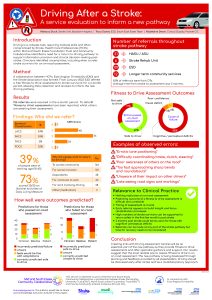
View and download the poster here
Implementation of an upper limb pathway to increase activity of the upper limb across two acute stroke recovery units

View and download the poster here
The ‘Art of Conversation’
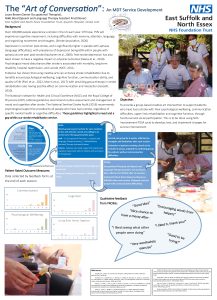
View and download the poster here
Making every moment count – a service improvement project to increase patient and family-led purposeful activity on a stroke rehabilitation ward
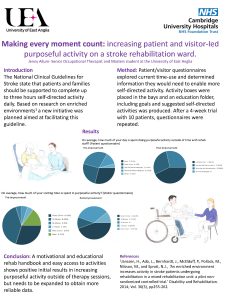
View and download the poster here
Implementing physiotherapy exercise groups in a large acute neurosciences unit
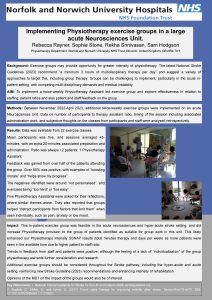
View and download the poster here
How acceptable are Aphasia iCafe interview student-led online social support groups
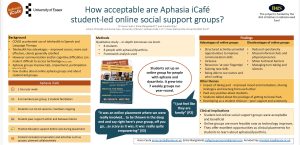
View and download the poster here
Cardia myxoma associated stroke – case presentation of elderly women with cardiac myxoma and stoke, best management literature review
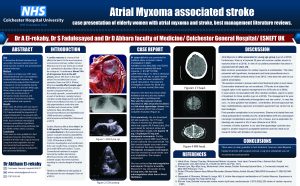
View and download the poster here
An exploration of physiotherapy students’ experiences of of using mirror therapy for neurological patients in a placement setting
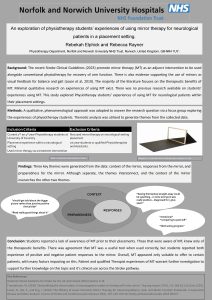
View and download the poster here
A co-created and personalised digital support package for stroke survivors and their families – ‘My Stroke Companion’
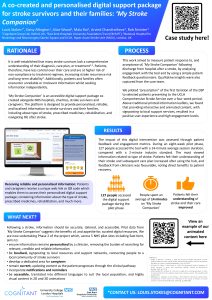
View and download the poster here
Get involved
To be kept up-to date on the interactive learning sessions, the regional conferences or to request access to the online repository, please register your interest below. If you would like to hear more about this project, or would like to get involved, please contact strokeforum@healthinnovationeast.co.uk.
You can also find out about our wider work in improving the detection and management of cardiovascular disease (CVD).
Share your idea
Do you have a great idea that could deliver meaningful change in the real world?
Get involved